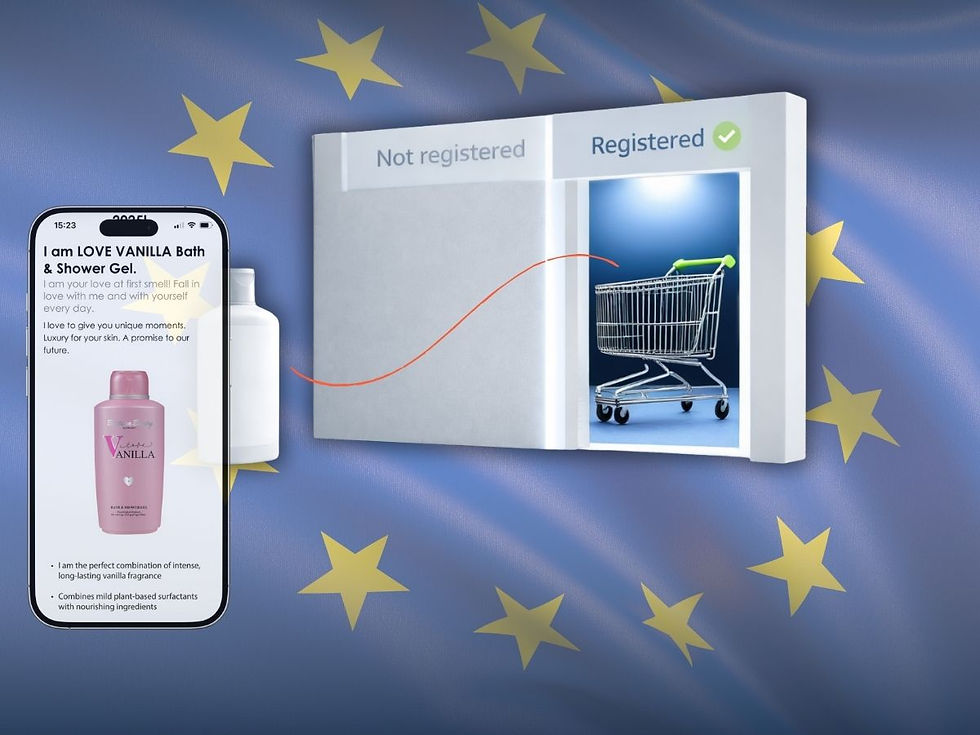You do want sustainable consumption. Don’t you?! Digital Product Passport on a Behavioral Psychology
- ingaellenkastens

- Jul 12, 2023
- 4 min read
Updated: Feb 8, 2025
The HWR - Berlin School of Law and Economics and Narravero are investigating the current user-friendliness of the Digital Product Passport in the wild, i.e. in the supermarket. What sounds dull to some people, puts a smile on our faces.

Elisa puts her finger in the wound of sustainable consumption
In the picture you can see 14-year-old Elisa. We took her to Björn Scherhorn's farm for a photo and video shoot. "We" - that was Linus Weistropp from the SuperBioMarkt plus team, Malte Syndicus plus team and me, Inga. The picture was taken this summer when we created content for the Digital Product Passports that were launched in the first stores here in Münster in June (Customer Case #3).
Elisa is a super reflective gal who already questions everything on her own. We had zero need to instruct her to ask deeper questions. Sitting on the sofa, she quizzed the savvy organic farmer on how he envisions a consistent shift from price consumption to value consumption. What Björn does to achieve this - and where his hands are simply tied. Because Björn can only see to it that he acts well, sustainably and animal welfare-oriented on the farm. In the supermarket, brains tick the way the (advertising) industry has taught them for decades.
Mind Behavior Gap: Want the Good, Buy the Bad
Basically, you know it too: You know that the T-shirt for 6.50 EUR has nothing to do with sustainable production. You know that milk for 60 cents promotes farm extinction. You know ... many things. And you act differently. So do I, and so do my colleagues. In marketing, this everyday behavior is called the "Mind Behavior Gap" or "Attitude Behavior Gap". This refers to the gap between our attitude, our will and our actions.
Especially when buying meat, milk, cheese, and other often low-priced foods, this phenomenon appears incessantly - and unabatedly. Deborah Shaheen, a student at the HWR in Berlin, wants to know what exactly the Digital Product can do about it and for sustainable consumption.
Digital Product Passport: Game Changer for Sustainable Consumption?
Deborah studies "International Marketing” with Prof. Dr. Dirk-Mario Boltz. I still know Mario from my "brand past" in Zurich, we first met at a brand congress in Berlin. That's how I know that this professor is simply driven by innovative topics.
Deborah's goal in her master thesis is to find out what concrete influence the Digital Product Passport has (not) on the decisions of customers in the German (organic) food sector regarding sustainable consumption. She also asks to what extent consumers trust the information that companies provide about their products. In addition to all the different labels that are supposed to provide orientation, consumers are confronted with sometimes misleading advertising.
When she wrote to us to ask if we would like to get to the bottom of these questions with her, it was immediately clear that there was probably no better place to do this than the SuperBioMarkt here in Münster! And Linus Weistropp was immediately willing to open the door for Deborah to conduct the qualitative study, i.e. interviews, on site with the customers.
SuperBioMarkt as a prime example of transparent communication
SuperBioMarkt AG has been a first mover for decades. Anyone who buys meat or cheese products there should be able to see and learn immediately where the food comes from.
And this "where from" has now been supplemented by a specific "from whom" through the Digital Product Passport!
Where did the animals grow up and who are the farmers? How were they treated and fed? Or how long have they been in the pasture or in the barn? And yes, what did their end of life look like? All these questions were answered by the Digital Product Passport, which was offered at selected products ("beef" and "cheese") at the fresh food counter.
"The Digital Product Passport is still new to us. In my opinion, however, it is a unique opportunity to take the transparency that we already live by to a whole new level. But at the end of the day, we want it to go down well with our customers and, ideally, make a difference. So Deborah's request is a great opportunity for us to get an impression of whether we're on the right track with our Digital Product Passport." Linus Weistropp, Marketing Director SuperBioMarkt AG
Sow emotional transparency, reap customer loyalty
The Digital Product Pass is undoubtedly the most emotional way to enter an interactive dialog with customers directly and One2One. I'll show you a few excerpts from the Digital Product Pass that was hidden "in" the cheese:
Videos, insights, direct comments - the look behind the scenes should make a "boom!" and show customers: "Look! We have nothing to hide!"
At the end of June 2023, Deborah traveled from Berlin to the Münster branch of the SuperBioMarkt on Grevener Strasse equipped with her interview questions and spoke with customers and employees of the SuperBioMarkt.
The case study is currently being evaluated. The results should provide initial information on how the Digital Product Passport "resonates with consumers" and how companies can use the new transparency tool to communicate their sustainability efforts in a credible way. And the Narravero development team is naturally eager to find out which levers we can use even better in the future.
Because one thing is clear: we are all just at the beginning of a new, transparent communication era!
Are you interested in insights and results?
Then contact Inga, who accompanies the study project internally:

Dr. Inga Ellen Kastens














